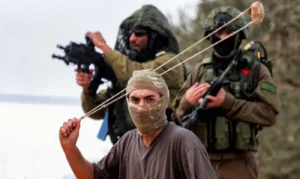Why are Israeli settlers destroying the Palestinian olive harvest?

Israeli soldiers stand behind a masked man slinging stones amid an Israeli settler attack on Palestinians harvesting olives in Beita, West Bank, on 10 October 2025
Daniel Tester writes in Middle East Eye on 29 October 2025:
The olive harvest has begun in the occupied West Bank – but with it have come frequent, persistent attacks by Israeli settlers on Palestinians and their trees.
During the first half of 2025, the UN Rights Office recorded 757 assaults by settlers that resulted in injury or damage to property. Palestinians have been targeted, olive groves destroyed, and crops ruined, drawing criticism from UN human rights chiefs and condemnation globally.
And in Gaza, which once had its own olive industry, almost all agricultural land has been destroyed by Israel’s two-year campaign, in which more than 68,000 Palestinians have been killed.
Why is olive farming significant to Palestinians?
The cultivation of olives, Palestine’s most widely harvested crop, dates back thousands of years to the ancient civilisations of the Mediterranean Basin. The ancient Greeks, for example, regarded the olive branch as a symbol of peace.
Over the centuries, the olive has been used in Palestine for food, cosmetics, soap, medicine, and fuel, while the wood of olive trees has been used for construction. Production increased markedly during the four centuries of Ottoman rule in Palestine that lasted until 1917, establishing the olive trade as an essential export.
Today, around half of all agricultural land in the occupied Palestinian territories is used for olive cultivation.
As Palestine’s most valuable crop per kilo, seasonal olive exports inject almost $200m into the Palestinian economy during a good year, according to a report from the Palestinian Trade Centre. Around 100,000 families in the West Bank, which Israel occupies, depend on income from the olive harvest, according to UN figures, including around 15 percent of working women.
Beyond being a centuries-old form of agriculture, the significance of olive cultivation for Palestinians goes deeper.
Mohammed Abu al-Rabb, an olive farmer from Jablun village near Jenin, told Middle East Eye that farmers feel a spiritual bond between themselves and the tree. “It’s not just a tree, it’s our ancestors’ legacy, and their will is for us to protect it.”
The olive tree is often used to symbolise sumud, the Palestinian concept of everyday resilience and perseverance that lent its name to the recent Gaza-bound aid flotilla.
What’s happening to olive farmers in the West Bank?
Palestinian agriculture, including olive groves, has long been attacked by Zionist settler groups since the British mandate that predated the founding of Israel.
There are now an estimated 700,000 Israeli settlers living in 150 settlements and 200 outposts in the West Bank. Both types of settlement are illegal under international law, with unauthorised outposts forbidden under Israeli law but routinely granted impunity by Israeli authorities.
In the years before the Hamas-led attacks on 7 October 2023, violence against Palestinian olive farmers increased as tensions grew in the West Bank.
In 2020, for instance, almost 40 percent of Palestinian olive farmers reported they had had their crops stolen or damaged by Israeli settlers in the previous year. Others faced harassment and violence during the harvest season.
Many attacks occurred with little pushback from the Israeli military, which controls security in the occupied West Bank.
